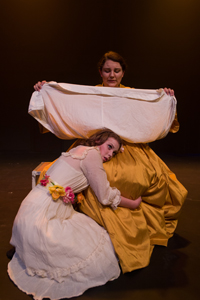by Nick Hensley
 Rape, child abuse, suicide, and abortion are just a few themes in the new Colorado State University theatre production of Spring Awakening. Based on the controversial German play written in 1891 by Frank Wedekind, Spring Awakening pushes the boundaries and stirs discussion about tough issues. It is truly a play you will never forget.
Rape, child abuse, suicide, and abortion are just a few themes in the new Colorado State University theatre production of Spring Awakening. Based on the controversial German play written in 1891 by Frank Wedekind, Spring Awakening pushes the boundaries and stirs discussion about tough issues. It is truly a play you will never forget.
A “tragedy of childhood,” Spring Awakening spotlights the life and struggles of a group of teenagers discovering the trials and tribulations of sexuality and coming of age. The story follows Melchior, Moritz, and Wendla as they wade through the uncertain waters of teenage life. The characters face many challenges that every teenager feels during their transition to adulthood. Set in an ambiguous location, the play boasts a pre-modern feel while still tackling current and tough issues. The play will hopefully raise discussion about topics in society that are often difficult to have.
“The play touches on those ideas of abortion, beating, rape, and suicide that are not usually discussed in regular conversation because of the potent emotions they bring up,” says cast member Tim Garrity. Garrity has several roles in the play that include the popular character of Headmaster Sunstroke. Garrity feels that the play has something very important to bring to the table.
“Yes, it should drum up a discussion of those topics that must be talked about even though we would prefer they didn’t exist,” says Garrity. “This dialogue is important because the ideas in the play are so real and pressing, even in this day and age.”
While the 2006 rock-musical has recently made the title well-known, the Broadway show is based on an original German play written in 1891 by Frank Wedekind. CSU’s production is a Colorado premier of a new translation by Denver playwright, Douglas Langworthy.
“I first read the play in its original language in a German literature class in college and immediately fell in love with it,” said Langworthy. “Not just for what it had to say about the importance of honesty in parent-child relationships, but also for its inventive form and style – each character has a unique voice, and finding their expression in English was a difficult yet satisfying challenge.
While the CSU production is translated from German, the production does not miss any of the play’s potency. While translating for the state between languages and time periods is often a challenge due in part to grammar and outdated phrases, Langworthy triumphs in his representation – allowing a modern audience to see things in a new light.
The play is directed by Garret Ayers, who has worked for over a decade as a professional actor and director with some of the world’s foremost theatre companies. Ayers feels that the play is not just an artistic presentation, but a production that means something important.
“This play really matters,” says Ayers. “Anyone passionate about life, about humanity, who loves to laugh, but also loves to wrestle with big issues, should see this production. This play has something for everyone – while not everyone is a parent, everyone has been a child.”
The production will be presented in a workshop style with minimal scenic elements for the purpose of focusing attention on the characters and content. Given the minimalistic nature of the production, the audience is really drawn to the actor’s expressive goal and inner thoughts. Despite the minimalistic scenery and undisclosed location, the play still carries a magical feel.
“In the midst of my preparation,” Ayers said, “I noticed many themes and metaphors related to fairy tales, and soon decided to frame the entire production around this vision that Spring Awakening was, essentially, a fairy tale… with one big difference. Fairy tales are written to teach us a specific moral lesson at the end of ‘happily ever after.’ There is no moralizing in this play. I was, and still am, passionately drawn to this idea of the play being a fairy tale without a moral.”
While the play hits home for many people, it has not always been so acclaimed. Originally presented in Germany during the late 1800’s, the play was either heavily censored or banned for 63 years due to the controversial topics it incorporates. The CSU production is uncensored and will present touchy topics and push the audience’s comfort levels to the extreme in order to generate thought about these sobering issues.
“Spring Awakening certainly pushes the boundaries of what is comfortable,” said Ayers. “But I find that reality to be pleasant – it definitely will push your envelope, but at the same time I feel that we are able to keep the audience on our side by not pushing it too hard. We touch on those tough ideas without punching people in the face with it.”
Spring Awakening performances run Oct. 11, 12, 13, 14, 18, 19, 20, 21, at 7:30 p.m. in the Studio Theatre at the University Center of the Arts, 1400 Remington St.
Tickets are $18 for the public and $8 for Colorado State students. Content is not appropriate for youth under 18. Tickets are available at the University Center for the Arts (UCA) Ticket Office in the UCA Griffin Lobby, by phone at (970) 491-2787, or online at www.CSUArtsTickets.com.

